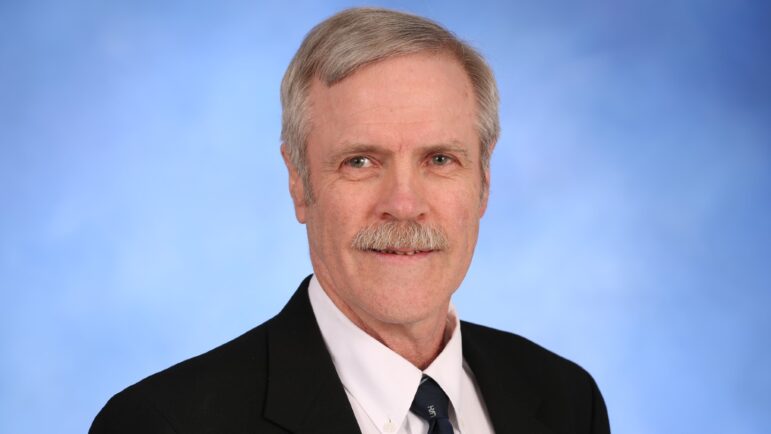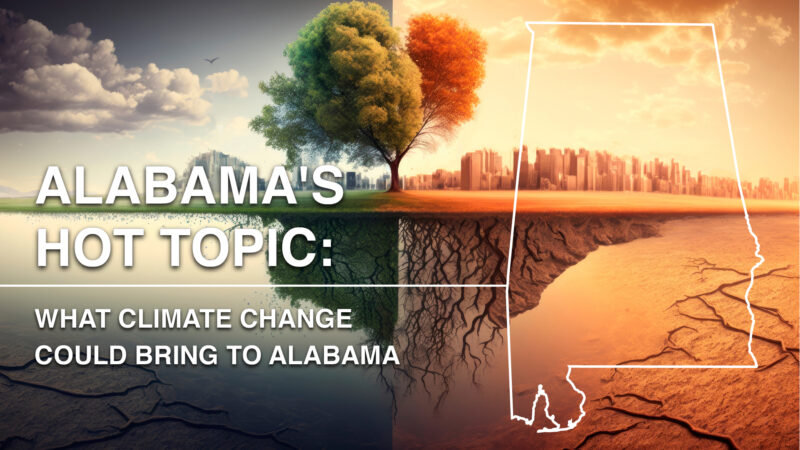Alabama’s John Christy may be the country’s best known and most criticized climate change skeptic
This story is part of a series “Alabama’s Hot Topic: What Climate Change Could Bring.” Read additional stories in the series.
Alabama’s State Climatologist John Christy is considered an outsider, if not a pariah, among most climate researchers. His critics say his work has been plagued by errors and many of his conclusions dismissed. Yet he defends his research and continues to have an outsized influence on the climate change debate well beyond Alabama’s borders.
Christy is no stranger to controversy and doesn’t shy away from the spotlight. By his count, he testified in front of Congress 20 times, mainly speaking on climate change.
He’s a favorite of the political right, in large part, because of his views that carbon dioxide emissions have very little influence on the climate.
“It has not been established that CO2 emissions have a confident and quantifiable causal link to climate change, whether one is talking about global temperature or about disruptive weather events,” he said before the House Natural Resources Committee in May 2015.
Christy, who is also on the faculty at the University of Alabama in Huntsville, offed unabashed praise for fossil fuels, despite their emission of carbon dioxide and other greenhouse gasses. He told WBHM they’re the best energy option available.
“Carbon is the one that gets people to the energy that they desire,” Christy said. “When you think about the carbon dioxide emission going up, which it is … it represents people living longer and better lives.”
Controversial conclusions

Christy reached his conclusions based on research he performed with another UAH professor, Roy Spencer, that used satellites to, in effect, measure the temperature of a portion of Earth’s atmosphere. In the early 1990s, when the research was first published, it seemed to show the planet was not warming like mainstream climate science said it was.
However, other researchers reviewed the results and found what they said were significant problems with its methodology, as well as the data it produced. In 1997 and 1998, shortly after Christy and Spencer published their findings, two different teams of researchers showed the orbit of satellites used to measure the temperature were inconsistent, thereby skewing results. Researchers also claimed they found problems stemming from data being gathered by different types of satellites, as older models were replaced by new.
Other studies found similar issues, including one in 2004 that published evidence that Christy and Spencer’s measurements of what they believed to be the lower atmosphere were being contaminated by the cooler upper atmosphere. The team also found many of the same problems with inconsistent orbits in Christy’s and Spencer’s research.
Early on, many researchers praised Christy’s and Spencer’s work, calling it groundbreaking. Christy and Spencer had said their data proved climate change modeling was wrong. In other words, the planet was not heating but cooling.
However, shortly after that data was originally published, the two UAH professors adjusted their calculations, which then showed a slight warming. After other researchers made what they claim to be additional necessary corrections, those adjustments now show considerably more heating of the atmosphere, bringing the data in line with mainstream climate models.
In the eyes of mainstream climate science, Christy’s and Spencer’s work has not aged well.
“They’re arguments are s***,” said Andrew Dessler, a Texas A&M professor and director of the Texas Center for Climate Studies, who is a frequent critic of the UAH team’s research.
According to Dessler, Christy’s and Spencer’s arguments have not swayed the scientific community. Dessler referred to a survey, touted by both NASA and the National Oceanic and Atmospheric Administration.
“Virtually 100% of the community agrees with the conclusions – the earth is warming. Humans are largely to blame for that,” Dessler said.
These days, Dessler said, Christy’s perspective on climate change seems less about science.
“It seems to be much more an argument that’s designed to generate soundbites that politicians can use,” Dessler said.
Christy pushes back
Christy brushes off criticism of his work. He also outright dismissed concerns about what appears to be a significant acceleration of changes in the climate. He said data about rising temperatures and sea levels that are setting off alarm bells worldwide are really nothing to worry about.
“It’s a problem for people who want to see a disaster story,” he said. “But it’s clearly, from the evidence we have, it is not a climate crisis at all.”
As proof, Christy pointed to crops and weather-related deaths.
“Look at crops around the world. Record crop yields every year,” Christy said. “The number of deaths from climate and weather-related events is down 98% from what it was 100 years ago.”
Both are arguments often used by climate change skeptics. They’re also frequently refuted by mainstream climate science.
It is true that yields have increased in the last 100 years. However, agricultural experts largely give credit to advances in farming equipment, as well as use of nitrogen, irrigation, and innovations in animal and crop genetics.
Many researchers believe climate change can make conditions better for growing crops in some regions, but very few. Overall, experts point to more climate change-caused extremes in weather — such as severe storms that produce heavy rains, winds and hail; as well as droughts and heat waves — outweighing any positives.
“Rising temperatures and carbon dioxide concentrations may increase some crop yields, but the yields of major commodity crops (such as corn, rice, and oats) are expected to be lower than they would in a future without climate change,” a report by the U.S. Environmental Protection Agency said.
As for decreases in deaths due to weather, it’s a similar explanation. Innovations such as advancements in forecasting and how we protect ourselves against storms, fires and heat waves have been the major reason for the decline.
According to a report by the World Meteorological Organization, the number of weather-related fatalities have fallen by two-thirds in the past 50 years. However, the number of reported disasters has increased by a factor of five over the same 50-year period, which is due in large part, to more extreme weather, which is exacerbated by climate change.
Additionally, 91% of weather-related deaths over the last five decades have happened in developing countries (using the United Nations Country Classification). A main cause for this disparity is that wealthier countries can afford those innovations in forecasting and protection, while poorer nations many times cannot.
“I sleep at night”
John Christy, as Alabama’s State Climatologist, doesn’t appear to get as much attention on the state level, as he does nationally. There also doesn’t appear to be rules limiting his tenure. According to a spokeswoman for Gov. Kay Ivey, the law only requires the state climatologist to be a member of UAH and appointed by the governor.
“Every governor since has recognized me as a state climatologist,” he said. “But I don’t have another declaration written out that says you are now the state climatologist, again. They just assume that I’m continuing on in that role.”
Gov. Don Siegelman first appointed Christy to the post in 2000.
“Looking back 20 years, my appointment of Dr. Christie was probably the right thing to do. He was from Alabama. He had a good reputation,” Siegelman said.
But now, Siegelman said Christy’s conclusions about climate change seem out of touch.
“His positions are not only contrary to my view, but seem to be in direct conflict with the majority of opinion of other climatologists, who are well-respected and their data has not been attacked as his has been,” Siegelman said. “This is not a drill. We are living in a climate crisis and we have to battle it and we have to fight it and we have to win it if civilization is going to survive.”
Christy shows no sign of stepping back from his role as state climatologist nor from the conversation that’s brought him so much heat.
“The information I produce stands, and that’s ultimately what’s important,” he said. “I sleep at night because I’m not trying to change the world.”
Editor’s note: Story updated to correct Andrew Dessler’s name.
Pentagon puts Scouts ‘on notice’ over DEI and girl-centered policies
After threatening to sever ties with the organization formerly known as the Boy Scouts, Defense Secretary Hegseth announced a 6-month reprieve
President Trump bans Anthropic from use in government systems
Trump called the AI lab a "RADICAL LEFT, WOKE COMPANY" in a social media post. The Pentagon also ordered all military contractors to stop doing business with Anthropic.
HUD proposes time limits and work requirements for rental aid
The rule would allow housing agencies and landlords to impose such requirements "to encourage self-sufficiency." Critics say most who can work already do, but their wages are low.
Paramount and Warner Bros’ deal is about merging studios, and a whole lot more
The nearly $111 billion marriage would unite Paramount and Warner film studios, streamers and television properties — including CNN — under the control of the wealthy Ellison family.
A new film follows Paul McCartney’s 2nd act after The Beatles’ breakup
While previous documentaries captured the frenzy of Beatlemania, Man on the Run focuses on McCartney in the years between the band's breakup and John Lennon's death.
An aspiring dancer. A wealthy benefactor. And ‘Dreams’ turned to nightmare
A new psychological drama from Mexican filmmaker Michel Franco centers on the torrid affair between a wealthy San Francisco philanthropist and an undocumented immigrant who aspires to be a dancer.







